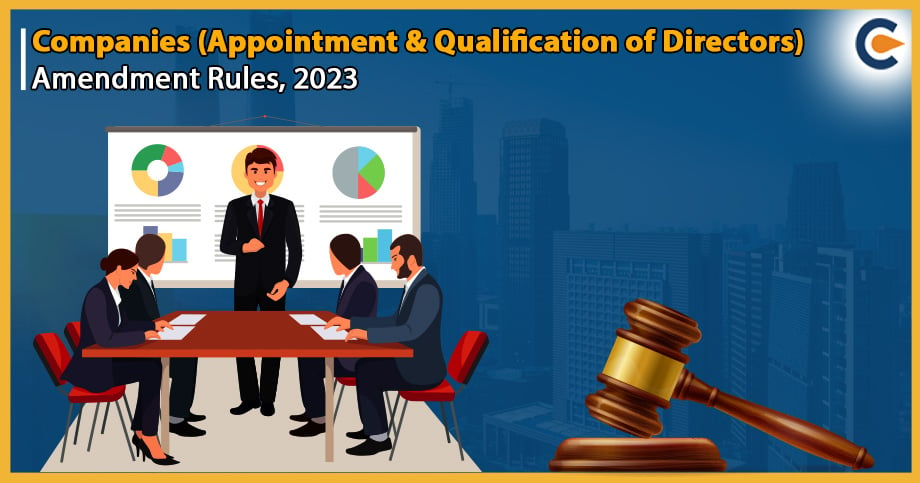The Ministry of Corporate Affairs or the MCA, vide a notification dated 20 January 2023, amended the Companies (Appointment & Qualification of Directors) Rules of 2014 through Companies (Appointment & Qualification of Directors) Amendment Rules, 2023. The notification primarily focuses on amending Rule 14 of the 2014 Rules, which pertains to the directors’ disqualification as per the provisions of Section 164 of the Companies Act of 2013, and also specific changes in a few MCA forms pertaining to the directors of a company. The Companies (Appointment & Qualification of Directors) Amendment Rules, 2023, became effective from 23 January 2023.
Amendments to Rule 14 of the Companies (Appointment & Qualification of Directors) Amendment, 2014
- Sub-rule 1 of Rule 14, was amended to insert the words “sub section (1)” after the phrase “disqualification under”.
Rule 14 of the Companies (Appointment & Qualification of Directors) Rules of 2014 pertains to directors’ disqualification under Section 164 of the Companies Act of 2013. Before the amendments, Rule 14 only dealt with disqualifications provided under Section 164(1). The amendment has the effect of bringing the disqualifications mentioned under Section 164(1) under the purview of Rule 14. Section 164 of the Companies Act of 2013 pertains to disqualifications for the appointment of directors.
Section 164(1) states that a person will be disqualified from being appointed as a director of a company in the circumstances mentioned below:- She is a person of unsound mind and has been declared so by a competent court.
- She is an undischarged insolvent.
- She has applied to the appropriate authority to be declared as an insolvent, and the application is still pending.
- She has been convicted for an offence involving moral turpitude or otherwise by a court of competent jurisdiction, and the sentence for the imprisonment of such an offence is not less than six months, and five years have not elapsed from the date on which the sentence expires.
- If she has been convicted of an offence and has been sentenced to be imprisoned for a period of 7 years or more.
- There exists any order which has been passed by a competent court or tribunal that disqualifies her from being appointed as a director, and such order is still in force.
- If she has been convicted of an offence as provided under Section 188 of the Companies Act of 2013 in association with a related party transaction during the last five years.
- If she has not paid any calls in relation to the shares of a company which are held by her either alone or jointly is another person, and a period of 6 months has passed on the date on which the payment of the call is required to be made.
- She hasn’t complied the provisions of Section 152(3) of the Companies Act of 2013. Section 152(3) states that a person won’t be appointed as one of the directors of a company unless she has been allotted the Director Identification Number or DIN or any other number which has been prescribed under Section 153 of the Companies Act of 2013 which pertains to application for allotment Director Identification Number.
- She is not in compliance with the provisions of section 165(1) of the Companies Act of 2013, which states the number of directorships a person can hold, including alternate directorship.
The disqualification from being appointed as a director under Section 164(2) pertains to someone who is already a director of a company which has defaulted in filing annual returns or financial statements for a continuous period of 3 years. Such a person is disqualified from being appointed as the director of another company. Moreover, it is also stated that if a company has defaulted in paying back deposits accepted by it or any interests thereon or failed to redeem a debenture or interest due on it or has defaulted in paying the dividend, it shall not be appointed as a director in another company re-appointed as a director in the same company whether default took place if the failure to redeem or pay continued for a period of more than a year. The bar from such appointment or reappointment shall be for a period of 5 years from the date of default.
- A new sub rule has been inserted after Rule 14 (1). The newly inserted Rule 14 (1A) states that whenever information under Form DIR-8 is received by a company, such company shall file Form DIR-9 with the registrar before the expiry of 30 days from when information under Form DIR-8 is obtained.
The insertion has the effect of placing an obligation on companies to file Form DIR-9 on receiving information pertaining to disqualification under Section 164 (1) and (2) under Form DIR-8.
Form DIR-8 is filed by a person to intimate the existence of any disqualifications which bar her from being appointed as one of the directors of a company as is given under section 164 of the Companies Act of 2013. Form DIR-9 is required to be filed by companies to report to the registrar any information received in relation to the disqualification of a person from being appointed as a director under Form DIR-8.
Earlier, the mandate was to file Form DIR-9 only when Form DIR-8 was filed by the director giving details of disqualification for reasons as per Section 164(2) of Companies Act of 2013. However, post the amendment. Companies are required to file form DIR-9 when details of disqualification as per both Section 164(1) and (2) are filed by a director under Form DIR-8.
- The other amendment is brought about in Rule 14 (5) of the Companies (Appointment & Qualification of Directors) Rules of 2014 by the insertion of the terms “and filed before the regional director” after the words “Form DIR-10”.
Form DIR-10 pertains to the application for the removal of the disqualification of directors.
The amendment makes it obligatory for any application pertaining to the removal of the disqualification of directors to be filed before the regional director. Earlier, it was not stated where the application under Form DIR-10 was supposed to be filed.
- An annexure is also attached to the
amended rules, which contains the updated version of the below mentioned forms.
The updated version shall substitute the earlier versions of these forms. The
forms are:
- Form DIR-3: This form is filed to apply for the allotment of the DIN or Director Identification Number prior to being appointed as a director in an existing LLP or company Section 153 all the Companies Act of 2013, Rule 9(1) of the Companies (Appointment & Qualification of Directors) Rules of 2014 and Rule 10 of the Limited Liability Partnership Rules of 2009.
- Form DIR-3C: This form is filed by companies to provide information about the managing director, directors, secretaries and managers of the company in accordance with Section 157 all the Companies Act of 2013 and Rule 10A (2) of the Companies (Appointment & Qualification of Directors) Rules of 2014.
- Form DIR-5: This form is filed to apply for surrendering the DIN or Director Identification in accordance with Section 153 all the Companies Act of 2013 and Rule 11 of the Companies (Appointment & Qualification of Directors) Rules of 2014.
- Form DIR-6: This form is to be filed to the Central Government to give information pertaining to any change in the details of the directors of a company or designated partners of an LLP in accordance with Rule 12 of the Companies (Appointment & Qualification of Directors) Rules of 2014.
- Form DIR-8: This form is filed by persons to intimate the existence of any disqualifications which bar her from being appointed as a director of a company as is given under section 164 (1) or (2) of the Companies Act of 2013 and Rule 14(1) of the Companies (Appointment & Qualification of Directors) Rules of 2014.
- Form DIR-9: Form DIR-9 is required to be filed by companies to report to the registrar any information received in relation to the disqualification of a person from being appointed as a director under Form DIR-8 in accordance with Section 164 all the Companies Act of 2013 and Rule 14(2) of the Companies (Appointment & Qualification of Directors) Rules of 2014.
- Form DIR-10: This form pertains to the application for the removal of disqualification of directors in accordance with Section 164 all the Companies Act of 2013 and Rule 14(5) of the Companies (Appointment & Qualification of Directors) Rules of 2014.
- Form DIR-11: This form is filed to provide notice of registration of a director to the registrar of companies in accordance with Section 168(1) of the Companies Act of 2013 and Rule 16 of the Companies (Appointment & Qualification of Directors) Rules of 2014.
- Form DIR-12: This form is filed to provide particulars in relation to the appointment of directors and key managerial personnel and any changes among the particulars as per Section 7(1) (c), Section 168 and Section 170(2) of the Companies Act of 2013, Rule 17 of the Companies (Incorporation) Rules of 2014 and Rules 8, 15, 18 of the Companies (Appointment & Qualification of Directors) Rules of 2014.
Conclusion
The Ministry of Corporate Affairs or the MCA[1], vide a notification dated 20 January 2023, amended the Companies (Appointment & Qualification of Directors) Rules, 2014 through Companies (Appointment & Qualification of Directors) Amendment Rules, 2023. The Companies (Appointment & Qualification of Directors) Amendment Rules, 2023, became effective from 23 January 2023. The notification primarily focuses on amending Rule 14 of the 2014 Rules, which pertains to the disqualification of directors under Section 164 of the Companies Act of 2013, and also on specific changes in a few DIR forms of the MCA pertaining to the directors of a company.
Read Our Article: Independent Director: Appointment Criteria, Process, Roles & Duties











